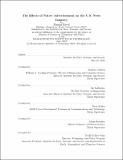The effects of native advertisement on the U.S. news industry/
Author(s)
Revel, Manon.
Download1117774997-MIT.pdf (7.546Mb)
Other Contributors
Massachusetts Institute of Technology. Institute for Data, Systems, and Society.
Technology and Policy Program.
Advisor
Munther Dahleh, Ali Jadbabaie, Dean Eckles and Adam Berinsky.
Terms of use
Metadata
Show full item recordAbstract
The migration of news to the web has given advertisers new opportunities to target readers with ever more personal and engaging ads. This sponsored content, known as native advertising, is placed in news publications often camouflaged as legitimate news. Though native ads bring revenue to the struggling U.S. news industry, their ability to draw loyal readers off-site could hurt publishers in the long run. Herein, I measure the quality and the impact of the ads from Content Recommendation Networks (CRN) on the U.S. news industry, between March 2016 and February 2019. A CRN controls both the third-party ads and the house ads -- recommendations for news articles from the host publisher -- on a news publisher's website. During the 2016 presidential election, I found that 17% of ad headlines were political, and 67% of the stories were clickbait. Over the 2018 midterm elections, 15% of the ads were political, and 73% were clickbait. While third-party ads are more clickbait than house ads, the increase in clickbait between 2016 and 2018 is larger for the house ads. Further, I investigate the effect that a one-time exposure to these ads have on the perceived credibility on news articles. Four publishers were under study: CNN, Fox News, The Atlantic and Sacramento Bee. A one-time exposure to CRN ads was found to have no signicant eect on the credibility of traditional publishers. Yet, the CRN ads impacted the credibility of less well-known publishers: ads increased the credibility of the news on Sacramento Bee, and decreased it on The Atlantic.
Description
This electronic version was submitted by the student author. The certified thesis is available in the Institute Archives and Special Collections. Thesis: S.M. in Technology and Policy, Massachusetts Institute of Technology, School of Engineering, Institute for Data, Systems, and Society, 2019 Cataloged from student-submitted PDF version of thesis. Includes bibliographical references (pages 91-93).
Date issued
2019Department
Massachusetts Institute of Technology. Institute for Data, Systems, and Society; Massachusetts Institute of Technology. Engineering Systems Division; Technology and Policy ProgramPublisher
Massachusetts Institute of Technology
Keywords
Institute for Data, Systems, and Society., Technology and Policy Program.